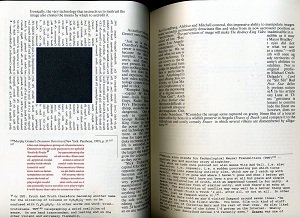
House of Leaves begins as a rather commonplace, if ponderous, horror story – an unreliable narrator Johnny Truant stumbles upon a manuscript or, rather, a collection of loosely connected notes constituting an amateurish critical analysis of a documentary movie called The Navidson Record, accompanied by copious footnotes referring to academia written on the subject of the said movie. The only problem being that, as far as Johnny Truant manages to find out, both the movie itself and the vast majority of literature mentioned in the manuscript don’t actually exist.
The Navidson Record tells about a photojournalist Will Navidson moving into a new house with his family; only to discover that this house is much more than a living space. Its spatial structure defies the laws of physics, it is larger on the inside than it is on the outside, new rooms appear out of nowhere, the atmosphere of uneasiness permeates everything.
The longer they live in this new place, the more threatening the house gets – and this atmosphere of uneasiness, of things not being what they are supposed to be is masterfully reflected in unusual formatting and structure of the novel. It finally becomes clear (as clear as anything gets in this book) that the house is closely connected with the myth of the Labyrinth and the Minotaur; in a sense, the house is the labyrinth.
But it is just one of the ways to understand it. The text itself is a labyrinth, with its constant references and cross-references, footnotes occupying pages at a time, weird formatting, text going sideways, diagonally or back to front – all reflecting the more and more confused state of mind of Johnny Truant, Will Navidson and, by extension, the reader.
As the things happening in the book get weirder, intertextuality reaches its climax: the boundaries between book and reality begin to blur. Navidson reads a book about Navidson, the book read by the reader, the book in which Navidson is reading a book. It might have been cheesy somewhere else, but Danielewski manages to pull this trick off, making the reader doubt for a moment his or her own reality or, for that matter, the unreality of what happens in the book.
In other words, House of Leaves is certainly a masterpiece of postmodern prose, a work that certainly proves that ergodic literature isn’t just pretentious nonsense created for the sake of being different – its principles can be used to a great effect, creating an impression impossible to be rendered in any other way.
